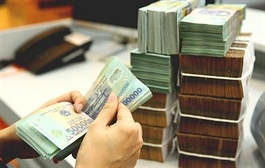Green credit balance figures on positive trajectory
Green credit balance figures on positive trajectory
While green credit balances at commercial banks are growing, Vietnam’s legal framework on the issue has yet to be completed, making it difficult for implementation.

The latest data from the State Bank of Vietnam (SBV) revealed that the total green credit balance in the nation currently hits VND528 trillion ($22.3 billion), accounting for only 5 per cent of the total outstanding debt of the economy.
The average growth rate of the green credit balance is positive at about 26 per cent per year. But if aiming for net-zero by 2050, capital and investment through credit channels are the main sources, so the growth rate of green credit at present cannot meet the requirements.
Nguyen Chi Hieu, director of environmental, social, and governance (ESG) consulting at KPMG Vietnam and Cambodia, said that Vietnam was estimated to need about $368-380 billion (equivalent to 6.8 per cent of GDP each year) until 2040 to transition to a green economy and cope with climate change.
“This is an opportunity for banks to participate in the green capital market,” Hieu said. “Meeting the criteria requires a lot of time and effort and cooperation from organisations, businesses, and communities, while Vietnam’s banking industry only accounts for 4.3 per cent of the total balance by the end of 2022.”
This is an increase of 12.9 per cent on-year, equivalent to about $21.1 billion.
SBV Deputy Governor Dao Minh Tu said that currently the number of credit institutions granting green credit was 43.
“The goal is that all credit institutions will participate in granting green credit by 2025 along with internal instructions and regulations to conduct social and environmental risk assessments,” he said.
He said this is not a new issue for banks. Green credit growth is currently not high, so the target is to reach 25 per cent by 2025 and 30-35 per cent by the end of 2023. The target proportion of green credit in the economy is to rise to 10 per cent (from 4.6 per cent) by the end of 2025.
Experts said that building infrastructure for green credit is the key to opening a strong green finance in Vietnam. However, commercial banks are currently struggling with selecting, appraising, evaluating, and monitoring in granting green credit.
Among the 12 green fields that the SBV guides credit institutions to lend, outstanding loans focus mainly on renewable energy, clean energy (accounting for 45 per cent), and green agriculture (31 per cent). Credit institutions have boosted the assessment of environmental and social risks in credit granting activities, with outstanding loans assessed for these risks making up nearly 20 per cent of the economy’s total outstanding loans.
Based on actual implementation, Nguyen Quoc Hung, project finance director at BIDV, said that there are some problems in appraising green projects.
“We do not have a specific basis for identifying and classifying green projects, causing some difficulties for commercial banks to select, appraise, evaluate, and monitor in granting green credit, while the legal framework in environmental and social risk management and green credit is being formulated,” Hung said.
Experts from banks said that the government’s mechanisms and incentives for green credit are encouragement only.
“There is no recognition mechanism in the evaluation and ranking for credit institutions with good achievements in green credit, as well as no mechanism to support capital suppliers or channels to access capital for credit institutions to promote green credit,” Hung claimed.
“Capital investment in industries generating environmental benefits, especially the field of renewable energy. Energy saving and efficiency in Vietnam often require long payback periods and large investment costs, while market risk is high. So incentives on loan terms and costs are needed.”
Nguyen Xuan Bac, deputy director general of the SBV’s Department of Credit for Economic Sectors, said that despite positive progress, green credit still faces difficulties, such as a shortage of national regulations on criteria to identify green projects.
In addition, granting green credit requires in-depth technical environmental factors, which will make it difficult for credit officers to appraise and evaluate the effectiveness of the project and the customer’s ability to repay debt.
“It’s necessary to improve the legal framework and develop a roadmap to implement policy mechanisms to support green industries and draw in investors to green projects,” Bac said.
























